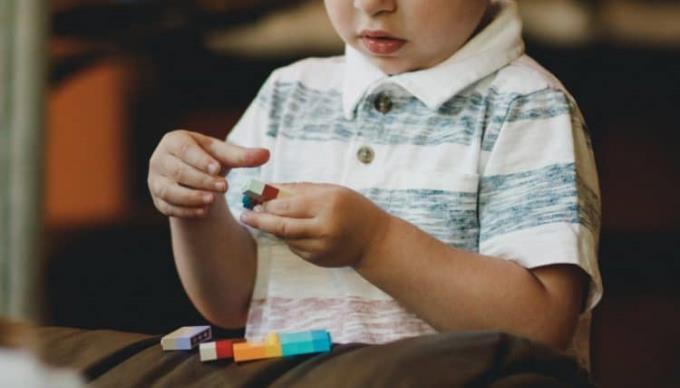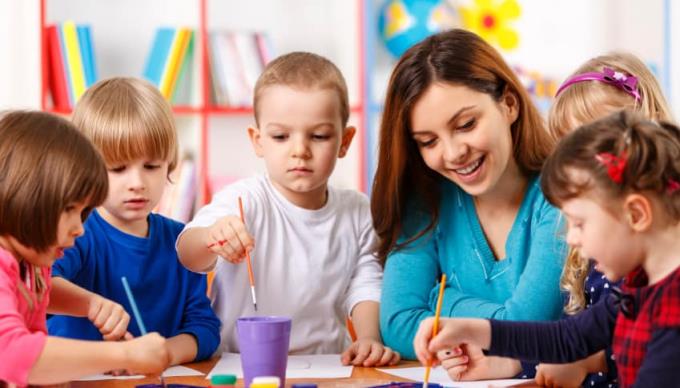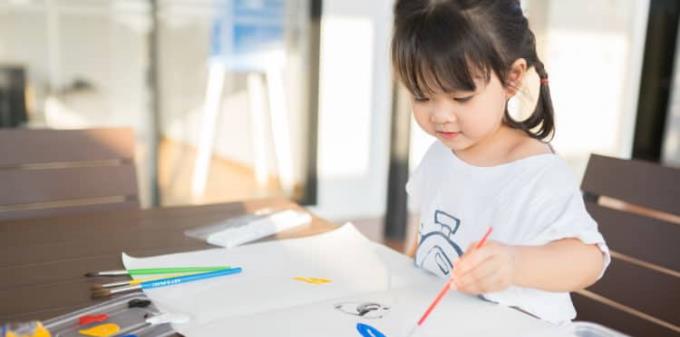Ways to determine an infants caloric needs

Learn how to determine your baby’s caloric needs, including the calories in breast milk and formula, to ensure your infant gets the right nutrition for healthy growth.
Montessori education method focuses on creating the best environment for children's development, giving children the opportunity to develop themselves in the most comprehensive way.
If you are bored with old and boring, theoretical teaching methods that are tired not only by children but also by adults, you may want to learn the Montessori method. With many benefits for children, today, this method is widely supported and applied.
Montessori is an educational method developed by Dr. Maria Montessori . This is a child-centered pedagogy through the children's scientific observations from birth to adulthood. Coming to the classroom, children are free to choose and be creative in the learning process and teachers will offer activities suitable for the child's age. Children will work in groups or independently to explore knowledge about the world around them and develop their maximum potential.
Early education methods are built from a child's perspective when they want to learn and learn in an environment that is carefully prepared. This educational method is also an approach to a comprehensive assessment of the child's physical, communication, emotion and perception.
The curriculum mainly focuses on important developmental milestones in children aged 3 - 5 years old. The younger children will be focused on practicing large muscle control and language skills. Children 4 years old can be introduced to motor skills as well as complete daily activities such as cooking, painting, making handicrafts. At 5 years old, children will expand their community experience through field trips.
Using the Montesorri method, it is not the teacher in the classroom but the students who decide how the day will work. This encourages children to share ideas and to work cooperatively to find directions. Children in the classroom will learn to respect people as well as build a sense of community from the influences of the living environment.

In this approach, students learn a curriculum designed based on the specific needs and abilities of each child. This is to allow children to explore and learn at their own pace and rules. Teachers do not compare children or give competitive achievements between children and other children, making them feel happy when coming to class.
Everything in the classroom is always within children's reach. Tables and chairs, bookshelves, toy cabinets are all suitable size for babies to help them sit comfortably and take whatever they like. In addition, older children also play with children, so teaching from classmates to learn from each other.
This educational approach allows children to choose the activities they want to do each day and when to do each activity. But this educational method still has specific basic rules that teachers and students must follow. This environment gradually teaches children to practice discipline and hone important skills such as concentration and self-control.
All objects in the classroom are positioned correctly on the shelf. When you complete an activity, your baby will have to put the objects back in the right place. This sense of order helps facilitate learning, self-discipline and respond to a child's innate need for an orderly environment. When working or playing in neat areas, children can unleash their creativity and focus entirely on the learning process.
In the classroom, the teacher will act as a guide, giving children the freedom to learn to experience, not decide how they must do. They also ensure the basic rules that the whole class must follow and encourage students to do their part, but don't interfere with the pace of the classroom.
Because children are free to choose activities for themselves and work according to their own rules, creativity in the classroom is always encouraged. Children often work on tasks for the joy found in the process rather than the end result, so creative inspiration will arise.
In addition, the baby's exposure to many different cultures also encourages children to expand their thinking about the world and solve problems in many ways.

Respect for young children is the foundation of all the principles of this educational approach. Teachers or instructors will have to show respect for children's opinions, kindness and fairness to them. Adults should listen to children's opinions while supporting their children to work or self-study according to the motto "learning children to teach children better". When chosen according to their own preferences, children can develop the skills and abilities necessary for a highly effective learning process and a positive self-esteem.
Young children's minds are always in a state of readiness and a desire to learn. You will receive new knowledge through your surroundings. Montessori, the creator of this method, believes that children have the ability to learn on their own. Although people often believe that humans acquire knowledge using the brain, in reality children learn a lot through direct or indirect contact.
Example: If you talk to your baby every day in your mother tongue, he will learn to speak his mother tongue quickly.
In addition, children can learn by themselves through learning. Teachers or parents should encourage children to self-learn and explore when teaching children in this method by introducing new objects and toys in the classroom, encouraging children to find out how to use them.
Many experts believe that children can easily learn certain things during a sensitive period. During this stage, the child begins to have a stronger ability to absorb but this only lasts for a period of time.
Teaching children with this method, teachers or instructors will closely monitor the child to ensure that the child is fully supported and the best learning opportunities during this sensitive time.
In the educational method, children will learn in an environment with many resources and opportunities for children to learn actively and freely explore and try. Teachers can prepare the best environment for children by observing baby's activity trends. Teachers are the ones who make sure children need what is fully provided and easily accessible.

The Montessori method in the family supports the learning of the baby from birth until secondary school. In addition, this educational method also brings many benefits to the baby through each specific stage:
Provides a safe, potential play environment to nurture your baby's mind and body.
Help children have confidence in themselves and their own world.
This early teaching method of teaching helps children to be confident when appearing in public.
Develops coordination of gross and fine motor and language skills.
Provide opportunities to cultivate independence in daily life or work.
Preschool teachers teach children by method by promoting the child's independence, perseverance in difficult situations and the ability to set self-limits.
Promotes the development of communication skills through respect, clear and safe connections, and important influences.
Creating opportunities for the exploration of imagination leads to the formation of confidence and creativity.
Give your children the opportunity to explore the benefits of cooperation in which their interests will be properly supported and guided.
Supports the development of confidence, imagination, independence in thought and action.
Promote understanding of children's role in community, in natural culture.
For children from 12 to 15 years old, teaching children according to Montessori method also works:
Emphasizes the development of emotional self-expression, true self-confidence, and interpersonal agility.
During this stage, children should be exposed to nature or farming as much as possible to learn how to protect the environment as well as acquire basic life skills.
Learn how to determine your baby’s caloric needs, including the calories in breast milk and formula, to ensure your infant gets the right nutrition for healthy growth.
Discover the top 5 smartest dog breeds in the world, including Border Collie, Poodle, German Shepherd, Golden Retriever, and Doberman Pinscher. Learn about their unique traits and why they are considered the most intelligent dogs.
Discover 7 nutritious and delicious ways to cook egg porridge for babies, including recipes with cheese, pumpkin, tomato, and more. Learn how to prepare baby-friendly egg porridge with our expert tips.
After a series of medical measures they obtained a complete human vascular system profile.
Watermelon is one of the fruits that many people love, not only cheap but also delicious, nutritious and refreshing in the summer. To get delicious watermelon pieces, show off your housewives, your artistic talents to cut beautiful pieces of watermelon.
aFamilyToday Health - The digestive system and body in each baby is different. Parents need to recognize notes to deal with when babies have a food allergy!
Babies need many factors for perfect development. aFamilyToday Health shares with parents things to keep in mind when babies are 8 weeks old so that parents can take care of their babies the best!
Babies need many factors for perfect development. aFamilyToday Health shares with parents things to keep in mind when babies are 18 weeks so that parents can take care of their babies the best!
Babies need many factors for perfect development. aFamilyToday Health shares with parents things to keep in mind when babies are 28 weeks old so that parents can take care of their babies the best!
Babies need many factors for perfect development. aFamilyToday Health shares with parents things to keep in mind when babies are 32 weeks old so that parents can take care of their babies the best!








